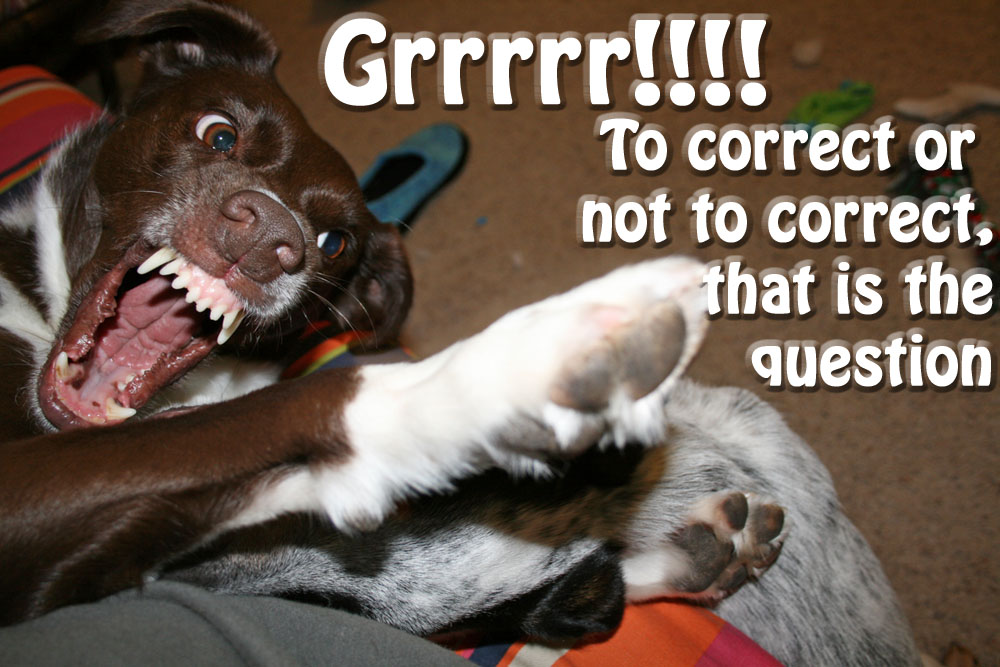 I’m still recovering from a two-day headache/nausea (does that constitute a migraine?) so please forgive any incoherent phrases LOL! Also, I didn’t realize I have used this photo before… there are only so many angry/growly photos to use! LOL!
I’m still recovering from a two-day headache/nausea (does that constitute a migraine?) so please forgive any incoherent phrases LOL! Also, I didn’t realize I have used this photo before… there are only so many angry/growly photos to use! LOL!
“Fido has a bad habit of growling when we are playing tug and when I try to clip his nails. How can I correct the growling so he stops? It makes me feel incredibly disrespected when he growls and it needs to stop.”
Well, then. I think it’s high time we listen to our dogs and what they are trying to communicate to us. A growl is a communication tool that dogs have at their disposal… it’s one of the more blatant and overt ways they have at communicating. I really think it’s important that we back away from this idea of correcting the dog for a growl and move toward addressing the reason behind the growl.
It is an incredibly dangerous act to correct a dog for growling. When we talk about corrections/punishments in a very scientific manner, a punishment will reduce the likelihood of a behavior repeating. So, each time you are correcting a growl you are making it less likely for them to growl again. Which sounds fine until you remember what a growl is a precursor to… yep, that’s right, a bite. Essentially, what happens is you create a dog who will not growl and will seemingly bite “without warning.” Instead of a very overt and blatant warning of a growl, you may end up with just a body freeze, pushed forward whiskers, a vibration in the tail, or an ear flick. These warnings are obviously much more subtle and easy to miss unless one is specifically looking for them–and chances are folks who are correcting a growl are not those who will know to look for these smaller warnings.
Now this isn’t suggesting that you allow the dog to continue to growl when being handled because if you continue to just force them to growl, chances are, you will eventually push one too many times and you will end up with a bite. Instead, I suggest you work on the reason behind the growl.
Instead of punishing a dog for growling during nail clipping, how about change the reason behind the growl. The dog is afraid/concerned about the nail clipping, so my first step would be to change that feeling by pairing the process of clipping nails with super yummy food. I would counter condition every aspect of nail clipping, from holding the leg, to touching the foot, to separating the toes, to putting the clipper near the nails, to squeezing the nail, and eventually to actually clipping the nail. By the end of the process the dog doesn’t feel the need to growl. I respected their fear/concern and addressed it not by hitting/tsch-ing/leash popping for the growl but eliminating the reason for the growl.
One of the more frustrating point of views I encounter is that people take things so personally. They are offended that their dog would growl at them… they say “my dog has the nerve” or “my dog has the audacity,” or they see it as disrespect. Look, it’s not personal. It is just their way of saying, “I’m not comfortable with this” or “please stop, I don’t like this” or “I’d really rather you didn’t” or any number of things. Although the growl itself sounds gruff and offending to our human ears, it is no more offensive than the aforementioned phrases… at worst it can be like a “Knock it of!!!” which is a little more forceful, but not really disrespectful.
Long story short… I wish people would value the growl for what it is… a communication tool. It is one way dogs communicate with us and is a very clear warning that a bite could be a next escalation.
(412) 849-7788
successjustclicks@gmail.com

Thank you for saying this; I always tell people that they should get on their knees and thank their dog for growling instead of getting upset or offended. I have one rescue who was beaten for growling (I know his background) and it has taken years to somewhat reinstall his signals for discomfort. He had learned that people wouldn’t listen to him and that his only option was to lash out-hard!-when confronted with anything scary or otherwise objectionable. He also had a number of health problems that increased his defensiveness about handling, and I learned a lot about reading his very subtle “tells” in the meantime.
I see an awful lot of dogs who are surrendered to our local shelters because they growled, often at a child. Most of the time these dogs are actually candidates for sainthood , I think, because they didn’t actually bite the little one who was pulling their hair/climbing on them/had them cornered but I guess it’s easier for people to condemn the dog to an almost certain death than to modify their child’s behavior. Grrrrr.
Great post! Too many people have no idea when it comes to their dog’s method of showing concern/communicating.
Wonderful article! The incorrect assumption that we must bully- excuse me, be “dominant” over- our dogs has led people to believe that a growl is a challenge that must be met with challenge. Additionally, I think a lot of people are uncomfortable with growling because they associate it with aggression. After living with a dog with serious fear issues that did not growl (fortunately, his body language read like a picture book, it was beautiful how easily you could read his signals) I relish the vocalizations that my other dogs offer to me. Correct the dogs? No, correct the situation!